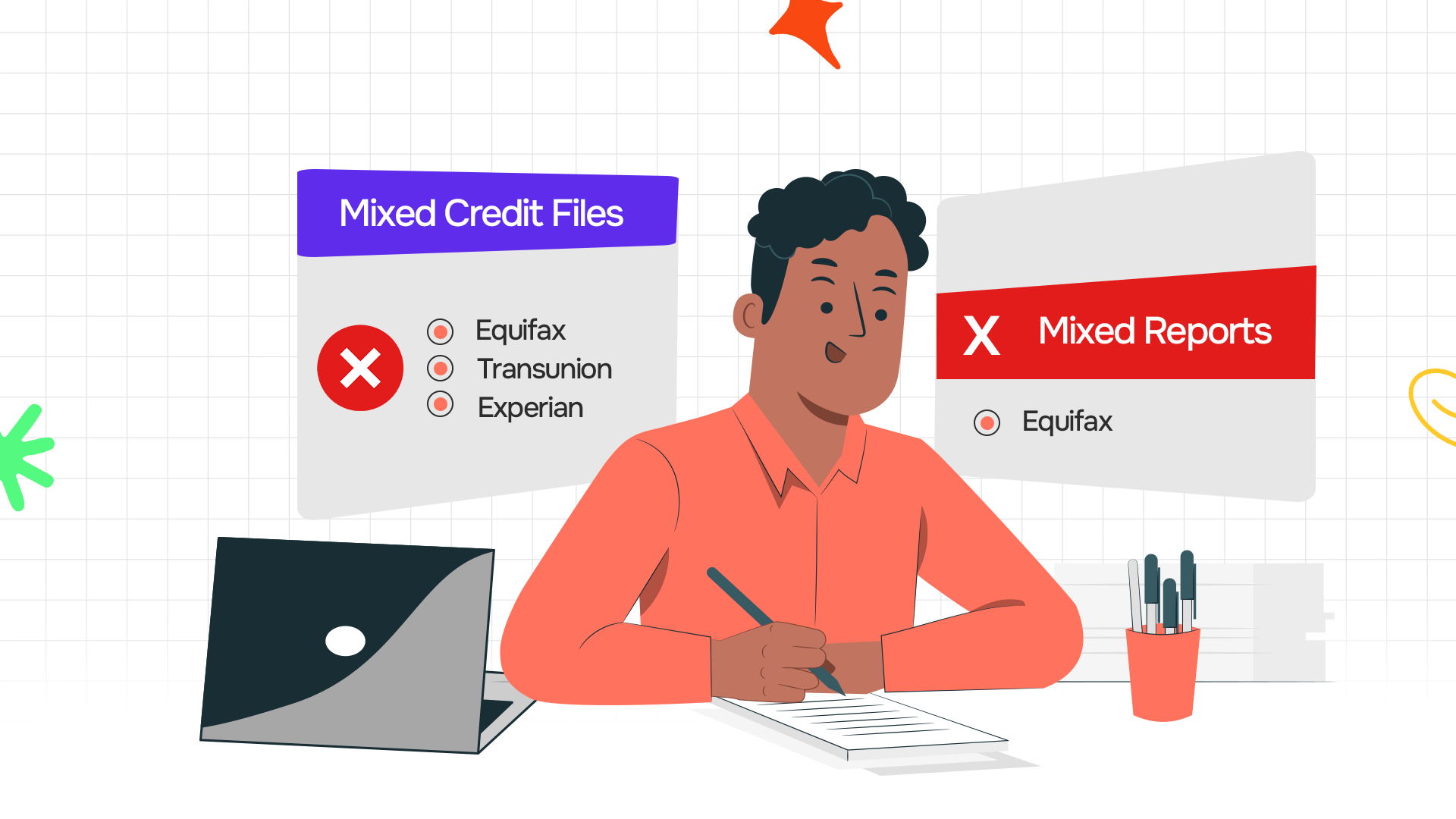Is Your Credit File Mixed Up? Here’s How to Fix Errors and Save Your Score — Fast
A mixed credit file can destroy your financial future if left unchecked. Learn the 5 essential steps to correct it, protect your identity, and rebuild your credit score the right way.

A mixed credit file is one of the most frustrating and damaging credit report errors a consumer can face. This occurs when credit bureaus incorrectly merge your credit history with someone else's, leading to inaccurate information affecting your credit score. If left uncorrected, a mixed credit file can result in denied loans, higher interest rates, and financial stress.
According to a study conducted by the Federal Trade Commission (FTC), on.e in five credit reports contains errors, with mixed credit files being one of the most complex to resolve. Given how much lenders rely on credit scores to determine eligibility for loans, mortgages, and credit cards, fixing these errors is crucial.
In this guide, we’ll explain how mixed credit files happen, how they can hurt your credit score, and most importantly, how to correct them and restore your financial reputation. Is a mixed credit file ruining your credit score? Continue reading to identify the issue and take immediate action to restore your credit in just 5 simple steps.
What is a Mixed Credit File?
A mixed credit file occurs when a credit bureau mistakenly merges the credit information of two different individuals into a single report. This type of error can have significant consequences, including incorrect credit scores, unjustified loan denials, and even higher interest rates. When someone else’s negative credit history appears on your report, it can damage your financial standing, making it difficult to secure credit or loans.
How Does a Mixed Credit File Happen?
Credit bureaus handle massive amounts of data and rely on algorithms to match credit profiles. Unfortunately, these systems aren't perfect and can misattribute credit data to the wrong individual due to similarities in identifying details. These mistakes often go unnoticed until a consumer experiences unexpected credit issues.
When a mixed file occurs, you may see:
- Accounts You Never Opened – Credit cards, loans, or mortgages that don’t belong to you.
- Unfamiliar Late Payments or Defaults – Another person's missed payments could reflect negatively on your report.
- Unexpected Drops in Your Credit Score – If the other person has poor credit habits, your score can take a significant hit.
Common Causes of Mixed Credit Files
Before learning to fix your mixed credit files, you must first understand
1. Similar Names
If you share a name with someone else—especially a common name like John Smith or Maria Garcia—there’s a higher chance that the credit bureaus might merge your credit history with theirs. This issue is particularly common when two individuals with similar names live in the same city or state.
2. Shared Addresses
Living at the same address as another individual with a similar name can increase the risk of a mixed credit file. This often happens in multi-generational households, rental properties, or dormitories. If a previous tenant or relative shares a name similar to yours, their credit information might mistakenly end up in your file.
3. Clerical or Reporting Errors
Mistakes made by creditors, lenders, or credit bureaus can result in incorrect information being reported. A single typo in a Social Security number or date of birth can cause two individuals' records to become entangled. If a lender misreports account information, the credit bureaus might incorrectly assign the data to your profile.
4. Identical or Similar Social Security Numbers
While Social Security numbers (SSNs) are unique, numbers that are similar—perhaps differing by just one or two digits—can sometimes lead to incorrect credit file merges. This type of mix-up is more common among individuals with sequentially assigned SSNs, such as family members or people born around the same time.
5. Junior/Senior Name Confusion
If you are a Jr. or Sr. with the same name as a parent or child, there is a greater risk of credit file merging. Since credit bureaus rely on name-matching as part of their data organization, a lack of proper differentiation between a father and son, for example, can cause serious credit issues.
The Consequences of a Mixed Credit File
A mixed credit file isn’t just a minor inconvenience—it can have serious financial repercussions:
- Lower Credit Scores – If the other person's credit history contains late payments or high debt levels, your score could drop significantly.
- Loan and Credit Denials – Lenders might reject your applications if they see negative credit activity that isn’t yours.
- Higher Interest Rates – If lenders believe you have a riskier credit profile, they may charge you higher interest on loans and credit cards.
- Difficulty Renting or Getting a Job – Many landlords and employers check credit reports. An inaccurate report could affect your housing or employment opportunities.
By recognizing these risks, you can take proactive steps to restore your credit and ensure that your financial reputation remains intact.
How a Mixed Credit File Can Hurt Your Credit Score
A mixed credit file can be devastating to your financial health. Here’s how it can impact your credit score:
1. Credit Score Drops Due to Errors

If someone else’s missed payments, charge-offs, or high credit utilization appear on your credit report, your credit score may plummet. According to FICO, 35% of your credit score is based on payment history—meaning even one incorrectly reported late payment can cause serious damage.
2. Difficulty Getting Approved for Loans
Lenders rely on your credit report to approve loans and credit applications. If your file contains negative accounts that aren’t yours, you might be denied credit or be forced to accept higher interest rates.
3. Increased Risk of Identity Theft
A mixed credit file can expose you to fraud. If someone else's credit information appears on your report, there’s a risk that your personal data is also exposed in their credit history.
4. Issues with Employment and Housing
Many employers and landlords check credit reports. A mixed credit file with erroneous negative information could cost you job opportunities or make it harder to rent an apartment.
How to Identify a Mixed Credit File
If you suspect that your credit report contains someone else’s information, take these steps to confirm:
1. Request Your Credit Reports
Under the Fair Credit Reporting Act (FCRA), you can access a free credit report from each of the three major bureaus (Equifax, Experian, and TransUnion) once a year through AnnualCreditReport.com.
2. Check for These Red Flags:
- Unknown Accounts: Credit cards, loans, or mortgages you never opened.
- Incorrect Personal Information: Wrong name, address, or Social Security number.
- Late Payments That Aren’t Yours: If your payment history is clean but you see late payments, it could be a mix-up.
- Debt Collection Notices: If collection agencies contact you about debts that aren’t yours, your credit file might be mixed.
3. Compare Reports from All Three Bureaus
Since not all creditors report to all three bureaus, an error may appear on one report but not another. Checking reports from Equifax, Experian, and TransUnion helps you identify inconsistencies.
How to Fix a Mixed Credit File and Restore Your Credit
Here are five pivotal ways to fix your mixed credit files and ultimately restore your credit.
1. File a Dispute with the Credit Bureaus
Under the FCRA, you have the right to dispute inaccurate information on your credit report. You can file disputes with each bureau:
- Experian: Experian Dispute Centre
- Equifax: Equifax Dispute
- TransUnion: TransUnion Dispute
When filing a dispute:
- Clearly state the incorrect information and why it doesn’t belong to you.
- Include supporting documents like a driver’s license, Social Security card, or utility bill for verification.
- Request a credit report correction and ensure the bureau notifies lenders of the update.
2. Contact the Creditor Directly
If the mixed information came from a specific creditor (e.g., a bank, lender, or credit card issuer), contact them directly and request that they correct their reporting to the credit bureaus.
3. Send a Written Dispute Letter via Certified Mail
For a stronger dispute, send a formal dispute letter to the credit bureaus via certified mail with a return receipt. This ensures you have a record of your request.
4. Monitor Your Credit Reports Regularly
Even after fixing a mixed credit file, continue to monitor your reports. Sign up for credit monitoring services to receive alerts about any changes or suspicious activity.
5. Seek Professional Help
If you’re struggling to fix your credit, professional credit repair services like Credit Veto can assist you in disputing errors and restoring your credit.
How Credit Veto Can Help You Fix a Mixed Credit File
Correcting a mixed credit file can be frustrating, confusing, and time-consuming. Credit bureaus require extensive documentation to prove your identity and verify the errors, and even then, disputes can take months to resolve. If you’re struggling with an incorrect credit report, Credit Veto is here to help.
Our AI-Powered credit repair system and expert team understands the complexity of credit reporting errors and works diligently to ensure your credit file reflects accurate and truthful information. Instead of navigating the dispute process alone, we provide a structured and results-driven approach to restoring your credit.
How We Fix Mixed Credit Files
Here are 4 fundamental ways we can help fix your credit files.
1. Comprehensive Credit Report Analysis
We start by thoroughly analyzing your credit report from all three major credit bureaus—Experian, Equifax, and TransUnion. This step helps us pinpoint incorrect accounts, unfamiliar addresses, and any suspicious activity that suggests your file has been merged with someone else’s.
2. Personalized Dispute Strategy
Once we identify errors, we create a tailored dispute strategy. We work directly with the credit bureaus and creditors to remove or correct any inaccurate information, ensuring that only your financial history appears on your report.
3. Direct Communication with Credit Bureaus
Instead of generic dispute letters, we provide legally backed and evidence-based documentation to compel the credit bureaus to correct their mistakes. Our approach increases the likelihood of faster and more effective resolutions.
4. Ongoing Credit Monitoring & Support
After your credit file is corrected, we don’t just leave you on your own. We offer ongoing credit monitoring services to ensure that errors don’t resurface and that your credit remains accurate moving forward.
Frequently Asked Questions (FAQs)
1. How long does it take to fix a mixed credit file?
It depends on the complexity of the case, but most credit bureaus are required to investigate disputes within 30 days. However, resolving multiple errors can take up to 90 days or more. With Credit Veto’s expert guidance and AI-powered system, you can ensure the process is handled as efficiently as possible.
2. Will fixing a mixed credit file improve my credit score?
Yes! If your credit report contains negative accounts that don’t belong to you, removing them can significantly boost your credit score. Even if the mix-up includes positive accounts, ensuring that your report accurately reflects only your financial history is crucial for long-term credit health.
3. Can a mixed credit file happen again after it's fixed?
Unfortunately, credit bureaus don’t always prevent recurring errors. That’s why credit monitoring is essential. At Credit Veto, we offer ongoing monitoring services to help you detect and resolve any new errors before they cause damage.
Take Control of Your Credit Today
A mixed credit file can put your financial future at risk, but you don’t have to deal with it alone. Credit Veto offers a proven solution to help you remove errors, restore your credit, and take back control of your financial identity.
Sign up today for our flat-rate credit repair packages and get started on your path to a clean, accurate credit report! Your credit is one of your most valuable assets—don’t let reporting errors hold you back.
Need expert help fixing serious credit mistakes? Join the 5x5 Credit Veto Challenge today and learn the proven system to repair credit confidently."




Comments ()